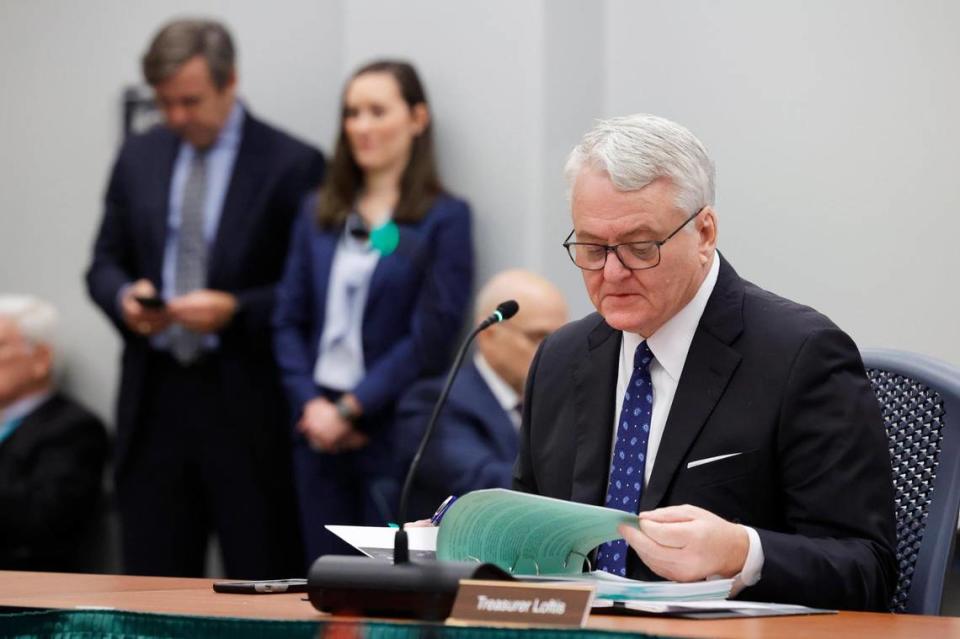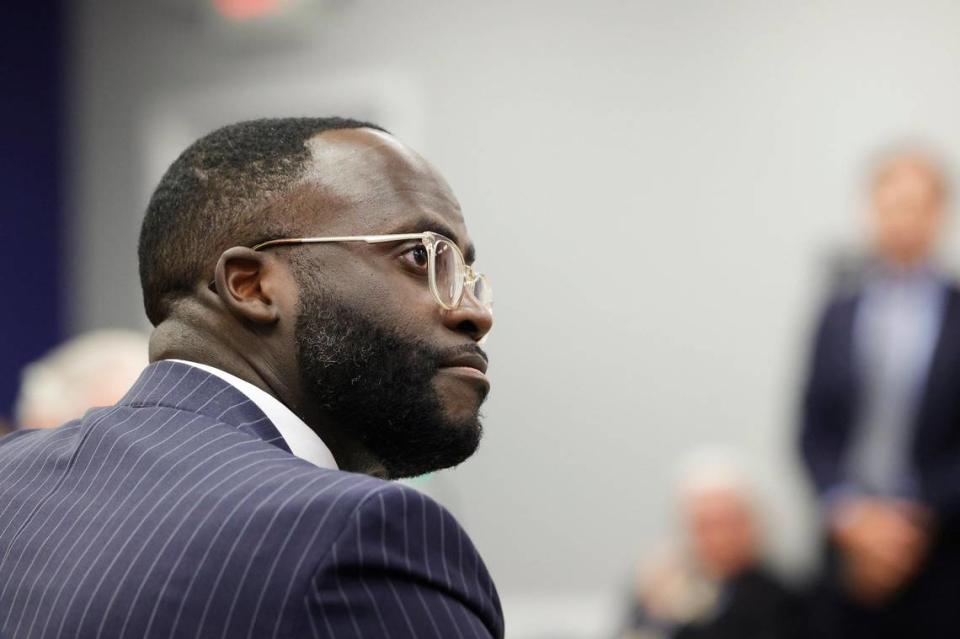SC comptroller vs. treasurer: Fingers point over knowledge of $1.8B account
As the state tries to figure out where $1.8 billion sitting in a flow-through account belongs, the state treasurer and comptroller general appear to be at odds with each other.
A new report, conducted to learn how a $3.5 billion accounting error accumulated over 10 years under the previous comptroller general, points to an ongoing tension between the two constitutional offices, one of which invests state money before it needs to be spent, and one that serves as the state’s top accountant.
The two entities have to work together to compile an annual comprehensive financial report, which is released in the fall and says how much cash the state has on hand, among other finances.
But a report from an outside accounting firm found as the 2023 financial report and previous reports were compiled, the treasurer and comptroller general’s office disagreed over the assignment of reporting responsibilities of money in certain accounts and funds.
“Attempts for the comptroller general’s office and state treasurer’s office to meet to discuss the issue have been relatively unsuccessful due to disagreement surrounding which agency should be responsible for reporting at the business area/fund level,” according to the report from Mauldin and Jenkins, the accounting firm commissioned last year.
Now Treasurer Curtis Loftis and Comptroller General Brian Gaines, who was appointed last year after Richard Eckstrom resigned, are both scheduled to testify Tuesday in front of a Senate Finance Committee panel led by state Sen. Larry Grooms, R-Berkeley.
In the lead up to the upcoming hearing, the tension between the two offices is leaking out publicly.
Grooms said that Gaines last year asked for information from the treasurer’s office about accounts, agency funds and investments Loftis had been making.
But the treasurer’s office had not provided the information, Grooms said.
It’s also information Eckstrom should have been asking for when he was in office, Grooms said.
“Some of the testimony from Eckstrom last year, he indicated that he wasn’t getting the information that he needed to be able to produce an accurate (annual comprehensive financial report),” Grooms said.
After Gaines took over the comptroller general’s office, he and Loftis had to work together to assemble the annual comprehensive financial report.
The $1.8 billion was brought to light when the comptroller began asking for information when putting together the latest annual financial report.
Loftis argued others knew about the existence of the $1.8 billion in the flow-through account before it was widely reported.
Loftis said the comptroller’s office and those with access to the state’s accounting system had access to the records of the flow-through account, “since those records are maintained in the SCEIS system and in fact the CGO and SCEIS teams may have additional documents not available to the STO.”
But within the last year, Loftis said Gaines stopped the meetings with the treasurer’s office.
“Comptroller General Gaines halted weekly meetings between the STO and the CGO and stated that no further meetings were necessary, and we would communicate by email,” Loftis said in a letter to state senators.
“We are perplexed by the lack of cooperation and finger-pointing by the Comptroller General’s Office and others since the restatement error came to light,” Loftis wrote. “Statements made about my office have sometimes been so off-base that I initially determined that no response was warranted. Regretfully, I seem to have underestimated the desire by some to avoid their responsibilities and to blame others.”

When asked about those comments, the comptroller general’s office said it willing to work towards a resolution and said the office’s role is not to “attribute responsibility.”
“The comptroller general remains willing to engage in any productive work efforts with relevant stakeholders to resolve this matter,” Kimberly McLeod, the public information officer for the comptroller general’s office, said in an email to The State.
McLeod said tension between sister agencies in state government is “nothing new” but Gaines is committed to working with others to resolve the issue.
“At times, professional relationships experience strains that require open communication and collaborative efforts to rebuild rapport,” McLeod said. “The comptroller general is committed to working with any and all stakeholders to resolve this matter on behalf of the citizens of South Carolina.”
Grooms, who is leading a panel investigating the accounting issues, had asked the treasurer’s office to determine which agency or agencies are entitled to the $1.8 billion. Grooms initially set a March 14 deadline for the treasurer which has come and gone.
“The (state treasurer’s office) has devoted considerable staff time to this issue and is fully prepared to continue its contributions to this effort, yet I must emphasize, as I have before, that this is a task beyond our independent capability, especially with an arbitrary deadline,” Loftis wrote in a March 14 letter to Grooms.
In November, the legislature learned about the existence of the $1.8 billion through the comptroller general. Grooms said the news should have come from the treasurer.
Tension between the treasurer and comptroller’s office existed before Gaines was in the office. Loftis pointed to how Eckstrom, who resigned last year after disclosure of his accounting error, used the $1.8 billion to bring down the double counting error. Loftis said inflation of state dollars was really $5.9 billion, but the existence of the $1.8 billion helped bring down the dollar amount. Overall, Eckstrom’s office inflated the state’s cash balances by $3.5 billion.
Gaines declined to comment on decisions made by Eckstrom.
According to the comptroller general’s office, the money in the account accumulated since 2017 when the state switched to a new accounting system.
“The treasurer’s office was responsible for the conversion and would be the sole entity with possession of all records related to their conversion,” McLeod said.
Gaines’ office in an email said the existence of the account is not really the issue, but rather where the $1.8 billion came from and who it properly belongs to.
“The fund is designated as a non-reportable “pass-through” fund that should always maintain a $0 balance,” McLeod said. “The $1.8 billion was never removed by the Treasurer’s Office (who controls the fund) from the fund and assigned to the appropriate fund.”
The comptroller’s office even points to a state law that says the treasurer is required to publish quarterly statements showing how much money the state has and which accounts they belong to.

Going forward after accounting issues
Lawmakers are now looking to spend $3 million on an outside audit, with an additional $1.2 million for the treasurer’s office to comply with the audit, to determine where the $1.8 billion belongs.
Loftis also has asked for assistance from the state’s oversight committee that looks over the state’s accounting system.
The problems around the comptroller general’s office that were discovered last year led to the Senate vote Tuesday to make the role appointed by the governor, with approval from the Senate. The resolution still needs approval from the House and the change requires a successful referendum to change the state constitution.
Whether a similar resolution to also make the treasurer role an appointed position depends on the ongoing investigation being led by Grooms.
“There’s some folks that wanted to hear more of our investigation before we talk about the state treasurer,” Grooms said.
Mauldin and Jenkins also recommended a person with appropriate level of authority over the comptroller and treasurer. Right now, an election or through legislative removal process, such as impeachment, are the only ways to change who runs those statewide elected offices.
Gov. Henry McMaster said he still had confidence in Loftis and Gaines despite the ongoing disagreement.
“I think these are grown men and they have staffs,” McMaster said. “This is a serious question to all the people. And I think we just have to communicate, collaborate and cooperate at every level. And this is one them.”
“It appears to me a we have a problem with systems. There’s something wrong somewhere. If we have $3.5 billion, it isn’t not properly recorded, or if we have $1.8 billion that’s in accounts, we don’t know why it’s there, what it’s supposed to be used for, how long it’s been there. That’s a problem,” McMaster added.

